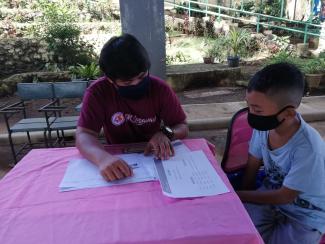March 2021 - In September 2019, Geraldine España began her new assignment as the school head of Lamba Elementary School. The school is located on the outskirts of Legazpi City, the capital of southern Luzon’s Bicol region. España was nervous. In her 18 years of working at the Department of Education (DepEd), España thought that city schools faced many challenges, especially in gathering community support for education initiatives.
She soon found out that her assumptions were wrong. Once she was there, teachers, parents, and barangay (village) leaders welcomed her. The school played a vital role in this small, coastal community's life.
Community members and members of local youth councils, locally called Sangguniang Kabataan (SK), often volunteered to help with school activities.
"I consider myself lucky that our school is located in a community with such strong participation by its residents," España said.
Lamba Elementary School was just about to conduct its yearly recognition ceremony when schools closed in mid-March due to the COVID-19 pandemic. By May, the DepEd secretary announced the suspension of face-to-face classes and launched the Basic Education-Learning Continuity Plan (BE-LCP).
España and other school heads across the country developed local BE-LCPs and identified appropriate learning methods for their communities. España found that although some parents preferred online learning and radio or TV-based instruction, the majority still opted for modular learning delivery, wherein learners use self-learning modules (SLMs) in print or digital format.
When the lockdown eased, España knew it would be important to understand student literacy levels so teachers could better meet the needs of their students. She spoke with barangay officials, community leaders, and the Sangguniang Kabataan (SK) council and learned about the SK council’s reading intervention program for struggling readers. España asked for support to conduct a USAID-developed rapid literacy assessment for students in grades 1 to 3, and the council quickly agreed.
After España and the school's K-3 teachers showed the SK leaders how to conduct the rapid literacy assessment, they took turns reporting to the school to assess at least 10 students every day.
Several SK leaders were pursuing education degrees. "Conducting the Rapid Literacy Assessment helped them gain real-life experience as teachers. They were pleased to help," España said.
After conducting the rapid literacy assessment, España discovered that only a small fraction of the students were grade ready. The majority of the students in grades I and 2 needed a full refresher, and a few required a moderate or light refresher. In order to help teachers, the SK leaders committed to expanding their remedial reading sessions through home visits or small group sessions at the barangay or community center.
“We are fortunate that the barangay has not recorded a single COVID-19 case, so we can conduct face-to-face sessions with students and parents while still observing health and safety protocols,” España explained.
As part of USAID’s support package, Lamba Elementary School received supplementary reading materials, such as leveled readers with corresponding teacher guides and home learning guides, from the ABC+ project. España and the teachers showed parents how to use these leveled readers to facilitate reading at home. USAID also trained teachers on adapting education practices to fit the new normal.
As members of a close-knit community, parents welcomed the SK leaders into their homes and freely discussed problems they encountered. In addition to providing remedial reading sessions, SK leaders also helped distribute and retrieve self-learning modules in remote areas.
USAID’s partnership with local communities provides struggling learners with the support they need so teachers can focus on monitoring the progress of struggling readers and coaching home learning partners, such as family members or volunteers who can guide children’s remote learning. Thanks to USAID assistance and these community partnerships, Lamba Elementary School has been able to successfully implement its BE-LCP. España hopes other schools can learn from these successes and form similar partnerships within their communities to support the students, parents, and teachers during the COVID-19 pandemic.

